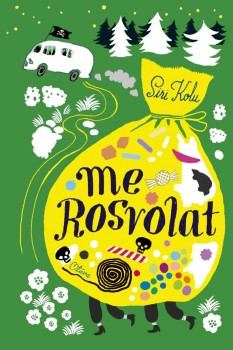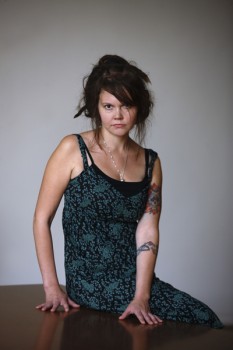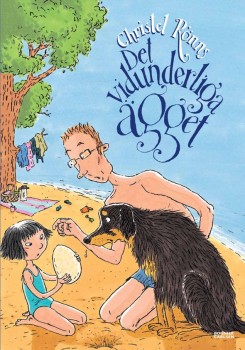Search results for "jarkko laine prize"
Finlandia Junior Prize 2010
26 November 2010 | In the news
 The Finlandia Junior Prize has gone to author Siri Kolu and illustrator Tuuli Juusela for the novel Me Rosvolat (‘Me and the Robbersons’, Otava); they will share the award of €30,000 (see the Prize jury assessments of the shortlist here). The winner was chosen by actor and writer Hannu-Pekka Björkman.
The Finlandia Junior Prize has gone to author Siri Kolu and illustrator Tuuli Juusela for the novel Me Rosvolat (‘Me and the Robbersons’, Otava); they will share the award of €30,000 (see the Prize jury assessments of the shortlist here). The winner was chosen by actor and writer Hannu-Pekka Björkman.
Awarding the prize on 25 November he said: ‘It caught my attention that in none of the six shortlisted children’s books are there any so-called nuclear families, at least not for long. The main characters constantly live and grow without something – the lack of parents or the attention of an adult is a serious matter to a child. However, in these books there is always someone who cares, not perhaps a stereotypical mom or dad, but an adult nevertheless.’ In Björkman’s opinion Me Rosvolat, with its rich language and a whiff of anarchy, presents the reader with moments of realisation and wonderment.
The Dancing Bear Poetry Prize 2014
7 August 2014 | In the news

Juha Kulmala. Photo: Kajaanin runoviikko, 2014
The Dancing Bear Poetry Prize (Tanssiva karhu -palkinto), founded by Yleisradio, the Finnish Broadcasting Company and worth €3,500, is awarded annually to a book of poetry published the previous year. In July, at a poetry festival – Kajaanin runoviikko – in the north-eastern town of Kajaani, it was given for the 20th time.
The winner was Juha Kulmala: his collection, entitled Pompeijin iloiset päivät (‘The merry days of Pompeii’, Savukeidas, 2013), is written in the vein of the ‘beat’ tradition of the poet’s home town of Turku; the landscape of the poems includes Finland and regions in Southern Europe.
The other finalists were Ville Hytönen, Harry Salmenniemi, Pauliina Haasjoki, Sinikka Vuola and Ralf Andtbacka. The prize jury, chaired by the poet Harri Nordell, chose the winner from almost 200 collections.
Yleisradio also awards a prize for the best poetry translation (Kääntäjäkarhu-palkinto) of the year, worth €1,100; this time it went, for the first time, to an anthology. Entitled 8+8. Suomalaista ja virolaista runoutta / Eesti ja Soome luulet (‘8+8. Finnish and Estonian poetry’, NyNorden, 2014) and edited by the Estonian poet and writer Eeva Park, the book contains poems by eight Estonian and eight Finnish poets, all published in Estonian and in Finnish, translated by twelve translators.
Winner of the Nordic Council Literature Prize
6 November 2014 | In the news

Kjell Westö. Photo: Kata Portin
The Nordic Council Literature Prize 2014 went to Kjell Westö and his novel Hägring 38 (‘Mirage 38’, 2013; in Finnish, Kangastus 38). The prize, awarded since 1962 and worth €47,000, was given on 29 October at a ceremony in Stockholm.
Among the 13 nominees was another Finn, the poet Henriikka Tavi with her collection Toivo (‘Hope’, 2011).
The jury said: ‘The Nordic Council Literature Prize goes to the Finnish writer Kjell Westö for the novel Mirage 38, the evocative prose of which breathes life into a critical moment in Finland’s history [the time before the Winter War, 1939–1940] – one that has links to the present day.’ Here, more on Westö and his winning novel.
On the shortlist: Runeberg Prize 2014
12 December 2013 | In the news
On the shortlist of the Runeberg Prize 2014 are eight books. Four of them are novels: Lapset auringon alla (‘Children under the sun’, WSOY) by Miki Liukkonen, Jokapäiväinen elämämme (‘Our daily life’, Teos) by Riikka Pelo (which was awarded the Finlandia Prize for Fiction in December), Pintanaarmuja (‘Scratches’, ntamo) by Maaria Päivinen and Terminaali (‘The terminal’, Siltala) by Hannu Raittila.
The other four books on the list are two collections of poetry, Pakopiste (‘Vanishing point’) by Kaisa Ijäs (Teos) and Öar i ett hav som strömmar by Henrika Ringbom (Schildts & Söderströms). Ahtaan paikan kammo (‘Claustrophobia’, Robustos) by Riitta S. Latvala is a collection of short stories, and Kopparbergsvägen 20 (‘Kopparbergsvägen Road 20’, Schildts & Söderströms) by Mathias Rosenlund is an autobiographical work.
The list was compiled by a jury of three: cultural editor and critic Elisabeth Nordgren, author and critic Irja Sinivaara and author Jouko Sirola.
The prize, worth €10,000, was founded by the Uusimaa newspaper, the City of Porvoo, both the Finnish and Finland-Swedish writers’ associations and the Finnish Critics’ Association. On 5 February, on the birthday of the national poet J.L. Runeberg (1804–1877), it will be awarded for the 28th time in his native town of Porvoo.
The novel that won: the Runeberg Prize 2012
9 February 2012 | In the news

Katja Kettu. Photo: WSOY
The Runeberg Prize for fiction, awarded this year for the twenty-sixth time, went to Katja Kettu for her third novel, Kätilö (‘The midwife’, WSOY).
Kettu (born 1978) is a writer and director of animated films. The prize, worth €10,000, was awarded on 5 February – the birthday of the poet J.L Runeberg (1804–1877) – in the southern Finnish city of Porvoo.
The jury – representing the prize’s founders, the Uusimaa newspaper, the city of Porvoo, both the Finnish and Finland-Swedish writers’ associations and the Finnish Critics’ Association – chose the winner from a shortlist of eight books. The jury was particularly impressed by the rich language of Kettu’s novel, set in the Lapp War of 1944–45, and the colourful portrayal of the characters.
The other seven finalists were a collection of essays and poems, Magnetmemoarerna, by Ralf Andtbacka (‘Magnet memoirs’, Ellips), the novel Tusenblad, en kvinna som snubblar (‘Millefeuille, the woman who stumbles’, Schildts), the novel Gisellen kuolema (‘Giselle’s death’, Robustos) by Siiri Eloranta, two collections of poems, Aallonmurtaja (‘The breakwater’, Otava) by Pauliina Haasjoki and De bronsblå solarna (‘The bronze-blue suns’, Söderströms) by Kurt Högnäs, a collection of short stories by Joni Pyysalo, entitled Ja muita novelleja (‘And other stories’, WSOY) and the novel Paljain käsin (‘With bare hands’, Gummerus) by Essi Tammimaa.
The Tollander Prize to Ulla-Lena Lundberg
17 February 2011 | In the news
One of the biggest literary prizes in Finland is the Tollander Prize, awarded annually on 5 February, the birthday of he national poet J.L. Runeberg, by Svenska litteratursällskapet i Finland (the Society of Swedish Literature in Finland). The prize is worth €35,000.
The recipient of the 2011 Tollander Prize is Ulla-Lena Lundberg, a versatile writer of novels, short stories, poems and travel essays. ‘She moves freely in different landscapes, times and cultures, finding universality in locality, whether on the island of Kökar in Åland, in Africa or in Siberia’, said the jury.
Written between 1989 and 1995, Lundberg’s fictional trilogy of Leo, Stora världen (‘The big world’) and Allt man kan önska sig (‘Everything one can wish for’), focused on the seafaring history and evolution of shipping in the Finnish Åland islands. Her autobiographical work Sibirien (Siberia’, 1993) has been published in German, Danish and Dutch.
Read the extracts from her latest book, Jägarens leende (‘Smile of the hunter’, 2010), on rock art, reviewed on our pages by Pia Ingström.
Winner of the Susan Sontag Prize
25 December 2010 | In the news
The Susan Sontag Foundation was established in New York in 2004 in memory of the celebrated author and cultural journalist Susan Sontag (1933–2004). The Foundation grants a prize to a young American who translates from other languages into English. In 2010 the prize was awarded for the third time.
Benjamin Mier-Cruz is currently pursuing his PhD in Scandinavian Languages and Literatures at University College Berkeley, with a particular interest in Finland-Swedish modernism and German expressionist poetry. His winning translation proposal is entitled Modernist Missives of Elmer Diktonius – Letters and Poetry of Elmer Diktonius.
Elmer Diktonius (1896–1961) was a rebellious Finland-Swedish avant-garde poet and composer, who was fluent in Finnish as well as his native Swedish. His letters to a wide range of European authors and critics, written between 1919 (the year of the Finnish Civil War) and 1951, reflect the political, artistic and personal developments in Finland and Europe.
The prize ceremony took place first in Helsinki on 5 November in a seminar at the Svenska litteratursällskapet i Finland (the Society of Swedish Literature in Finland), then at Scandinavia House, New York, on 12 November.
The Finlandia Prize for Fiction 2012
13 December 2012 | In the news

Ulla-Lena Lundberg. Photo: Cata Portin
The winner of the 29th Finlandia Prize for Fiction 2012, worth €30,000, is Ulla-Lena Lundberg for her novel Is (‘Ice’, Schildts & Söderströms), Finnish translation Jää (Teos & Schildts & Söderströms). The prize was awarded on 4 December.
The winning novel – set in a young priest’s family in the Åland archipelago – was selected by Tarja Halonen, President of Finland between 2000 and 2012, from a shortlist of six.
In her award speech she said that she had read Lundberg’s novel as ‘purely fictive’, and that it was only later that she had heard that it was based on the history of the writer’s own family; ‘I fell in love with the book as a book. Lundberg’s language is in some inexplicable way ageless. The book depicts the islanders’ lives in the years of post-war austerity. Pastor Petter Kummel is, I believe, almost the symbol of the age of the new peace, an optimist who believes in goodness, but who needs others to put his visions into practice, above all his wife Mona.’
Author and ethnologist Ulla-Lena Lundberg (born 1947) has since 1962 written novels, short stories, radio plays and non-fiction books: here you will find extracts from her Jägarens leende. Resor in hällkonstens rymd (‘Smile of the hunter. Travels in the space of rock art’, Söderströms, 2010). Among her novels is a trilogy (1989–1995) set in her native Åland islands, which lie midway between Finland and Sweden. Her books have been translated into five languages.
Appointed by the Finnish Book Foundation, the prize jury (researcher Janna Kantola, teacher of Finnish Riitta Kulmanen and film producer Lasse Saarinen) shortlisted the following novels: Maihinnousu (‘The landing’, Like) by Riikka Ala-Harja, Popula (Otava) by Pirjo Hassinen, Dora, Dora (Otava) by Heidi Köngäs, Nälkävuosi (‘The year of hunger’, Siltala) by Aki Ollikainen and Mr. Smith (WSOY) by Juha Seppälä.
Finlandia Prize for Fiction 2013
14 November 2013 | In the news
One of the following six novels will be awarded this year’s Finlandia Prize for Fiction, worth 30,000 euros: Ystäväni Rasputin (’My friend Rasputin’) by JP Koskinen, Hotel Sapiens (Teos) by Leena Krohn, Jokapäiväinen elämämme (‘Our everyday life’, Teos) by Riikka Pelo, Terminaali (‘The terminal’, Siltala) by Hannu Raittila, Herodes (‘Herod’, WSOY) by Asko Sahlberg and Hägring 38 (‘Mirage 38’, Schildts & Söderströms; Finnish translation, Kangastus, Otava) by Kjell Westö.
Half of the writers have already won the Finlandia Prize once, namely Krohn (1992), Raittila (2001) and Westö (2006).
Four of the six works deal with a historical character or history: Koskinen with the Russian ‘holy man’ Rasputin, Pelo with the Russian poet Marina Tsvetaeva, Sahlberg with Herod the Great of Judea. Westö goes back to the year 1938 in Finland.
Raittila’s realistic novel takes place on contemporary airports. Krohn, again taking a look at an unknown future, presents the reader with a imaginary Earth which no longer is habitable to humans.
The runners-up were chosen by a jury – appointed by the Finnish Book Publishers’ Association – of three: the journalists Nina Paavolainen and Raisa Rauhamaa and the translator Juhani Lindholm. The winner of the 30th Finlandia Prize for Fiction will chosen by theatre manager of the Helsinki City Theatre and actor Asko Sarkola, and announced on 3 December.
How to build a Finlandia Prize-winning novel
4 December 2009 | In the news

Antti Hyry
The Finlandia Prize for Fiction 2009, worth €30,000, was awarded to Antti Hyry (born 1931) on 2nd December; his novel about building a stove, Uuni (‘The stove’, Otava), was chosen by the art historian and former director of the Finnish National Gallery, Tuula Arkio, from a shortlist of six. More…
Junior Prize
4 December 2009 | In the news

Mari Kujanpää
The Finlandia Junior Prize, for the best book for children and young people, was awarded on 24 November to Mari Kujanpää (born 1976) for her third book for children, Minä ja Muro (‘Me and Muro’, illustrated by Aino-Maija Metsola, Otava). More…
Eino Leino Prize to Hannele Huovi
17 April 2009 | In the news

Hannele Huovi. - Photo: Laura Vesa
‘Methinks,/ said the sausage dog / who loved eating verse, that / poetry is tastier than bone.’ (From Karvakorvan runopurkki [Furry pooch’s jar of verse])
Hannele Huovi (born 1949) has received the 2009 Eino Leino Prize, worth € 5,200 and funded by the Finnish Book Foundation, for her extensive work as a writer of books for children and young people, of novels, poetry and text books. More…
Shortlist for Finlandia Prize for Non-Fiction 2014
13 November 2014 | In the news
 The shortlist for the Finlandia Prize for Non-Fiction 2014 – worth €30,000 – was announced on 5 November by the chairperson of the jury, Susanna Pettersson, Director of the Ateneum Art Museum. The works on the list of six are as follows:
The shortlist for the Finlandia Prize for Non-Fiction 2014 – worth €30,000 – was announced on 5 November by the chairperson of the jury, Susanna Pettersson, Director of the Ateneum Art Museum. The works on the list of six are as follows:
Pohjolan leijona, Kustaa II Adolf ja Suomi 1611–1632 (‘The lion of the North. Gustavus II Adolphus and Finland 1611–1632’, Siltala) by the historian and author Mirkka Lappalainen deals with the implications of actions of the mighty Swedish king on the part of the kingdom that was known as Finland.
Herkkä, hellä, hehkuvainen – Minna Canth (‘Sensitive, gentle, radiant – Minna Canth’, Otava) is a fresh biography of the Finnish pre-feminist author (1844–1897), a popularised version of a dissertation by Minna Maijala.
Karanteeni. Kuinka aids saapui Suomeen (‘Quarantine. How Aids came to Finland’, Siltala) by Hanna Nikkanen & Antti Järvi records the history of the disease, its arrival and consequences in Finland.
Operaatio Elop (‘Operation Elop’, Teos) by Pekka Nykänen & Merina Salminen is the story of the mobile phone company Nokia in its declining years and its Canadian CEO (2010–2013) Stephen Elop, who did not become the saviour of the company on the global market.
Usko, toivo ja raskaus. Vanhoillislestadiolaista perhe-elämää (‘Faith, hope and pregnancy’, Atena) by Aila Ruoho &Vuokko Ilola focuses on the family life, particularly the status of the woman, of a fundamentalist religious community in Finland.
Tulisaarna. Einojuhani Rautavaaran elämä ja teokset (‘Fiery sermon. Life and works of Einojuhani Rautavaara’, Teos) by Samuli Tiikkaja (journalist, music critic and researcher) is a biography of the composer Einojuhani Rautavaara (born 1928).
The winner – according to the rules of the prize, it will be given to a deserving Finnish generalist non-fiction book – will be chosen by Heikki Hellman, journalist and Dean ofthe School of Communication, Media and Theatre in Tampere, on 19 November.
Finlandia Prize for Fiction candidates 2012
23 November 2012 | In the news
The candidates for the Finlandia Prize for Fiction 2012 were announced on 15 November. They are Riikka Ala-Harja, Pirjo Hassinen, Heidi Köngäs, Ulla-Lena Lundberg, Aki Ollikainen and Juha Seppälä.
Their novels, respectively, are Maihinnousu (‘The landing’, Like), Popula (Otava), Dora, Dora (Otava), Is (‘Ice’, Schildts & Söderströms), Nälkävuosi (‘The year of hunger’, Siltala) and Mr. Smith (WSOY).
The jury – researcher Janna Kantola, teacher of Finnish Riitta Kulmanen and film producer Lasse Saarinen – made their choice out of ca. 130 novels. The winner, chosen by Tarja Halonen, who was President of Finland between 2000 and 2012, will be announced on 4 December. The prize, awarded since 1984, is worth 30,000 euros.
The jury’s chair, Janna Kantola, commented: ‘One of this year’s recurrent themes is the Lapland War [of 1944–1945]. Writers appear to be pondering the role of Germany in both the Second World War and in contemporary Europe. Social phenomena are examined using satire; the butt is the birth and activity of extremist political movements. Economics, the gutting of money and market forces, are present, as in previous years, but now increasingly with a sense of social responsibility.’
Popula deals with people involved in a contemporary populist political party. Dora, Dora describes Albert Speer’s journey to Finnish Lapland in 1943. Nälkävuosi depicts the year of hunger in Finland, 1868. Is takes place in the Finnish archipelago of the post-war years. Mr. Smith portrays greed and the destructive power of money both in Russian and Finnish history as well as in contemporary Finland. Maihinnousu, set in Normandy, depicts a child’s serious disease in a family that is going through divorce.
Finlandia Junior Prize 2012
5 December 2012 | In the news
 The Finlandia Junior Prize 2012 went to the illustrator and writer Christel Rönns for her book Det vidunderliga ägget (‘The extraordinary egg’, Söderströms & BonnierCarlsen).
The Finlandia Junior Prize 2012 went to the illustrator and writer Christel Rönns for her book Det vidunderliga ägget (‘The extraordinary egg’, Söderströms & BonnierCarlsen).
The winner was chosen from the shortlist of six by the film director and actor Mari Rantasila. Awarding the prize, worth €30,000, on 29 November she said:
‘The book has masterly, original and clear illustrations that support the story; the drawings include amusing details. It is refreshing to read a story about a family that all pulls in the same direction.
‘Det vidunderliga ägget deals with important matters, in a way that is suitable for small children: toleration of difference and the difficulty of loss, underlining that difference is not frightening or negative.’
The following five books also made it to the shortlist: Nörtti: new game (‘The nerd: new game’, Otava), about a schoolboy, bullying and social media by Aleksi Delikouras, Tatu ja Patu pihalla (‘Tatu and Patu on the yard’, Otava), a new picture book in the series about two curious little boys by Aino Havukainen and Sami Toivonen, Hurraa Helsinki! (‘Hurrah Helsinki!’, Tammi), a picture book about Helsinki by Karo Hämäläinen and Salla Savolainen, Puhelias Elias (‘Talkative Elias’, Tammi), an illustrated story about a little boy and his parent’s separation by Essi Kummu and Marika Maijala, and Kirkkaalla liekillä (‘With a bright flame’, Robustos), about 15-year-old Maaria, who lives through difficult times, by Venla Saalo.
